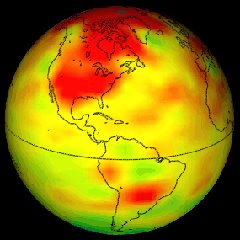What America thinks about global warming
 Eighty-five percent of Americans believe that global warming is probably happening, according to a report on a new TIME Magazine / ABC News / Stanford University poll out today. And even more Americans polled — 88 percent — believe that the warming will affect future generations.*
Eighty-five percent of Americans believe that global warming is probably happening, according to a report on a new TIME Magazine / ABC News / Stanford University poll out today. And even more Americans polled — 88 percent — believe that the warming will affect future generations.*While many people agree that the globe is, in fact, warming, some argue over the causes. According to the poll, three in ten Americans blame humans for global warming, whereas two in ten say the warming mostly has natural causes. The rest — nearly half — believe that global warming is caused by a combination of the two.
Almost 70 percent of those polled believe the government should do more to address the problem.
Read more in this 26-page global warming cover story in TIME Magazine. (You'll have to register to read it, but you won't have to pay.) ☼
*I'm a little baffled about these two statistics, as they imply that three percent of the people polled believe that global warming probably isn't happening but yet think that this non-existent warming will affect future generations. Anyone know what might be going on?

2 Comments:
Hi Chris,
Thanks so much for your thoughtful comments. You raise some very interesting points.
Just to answer your last two questions:
Our professors don't dictate what kind of journalists they wants us to be; they instead provide us with the tools we need to make up own minds. They don't really teach one journalistic philosophy over another, but they provide us with ample opportunities to discuss such issues at length.
Stemming from that, I think it is up to the individual journalist to decide how he or she perceives his or her role or duty within society. Other journalists might completely disgree with my opinion on this, so I'm just speaking for myself here.
I feel that a journalist who has been trained in a specialism -- in my case, in science and in reporting on science -- has a responsibility beyond that of just a stenographer or recorder of facts, events, or public opinion. Certainly, those are important components of any journalism. But I also believe that journalists trained in a particular field have the responsibility to bring their knowledge and associated analytical skills to their journalism, and to write, as one of my professors described today, "evidence-based journalism." I always try to portray whatever it is that the science really says or points to. If there are two sides to an issue but science strongly supports one side over the other, then I wouldn't feel I had to cover the issue with "50/50 balance."
I wouldn't go so far as to say that I want to write advocacy journalism, though I think this is a legitimate form of journalism too, provided two things: that the journalist's opinions and biases are laid out openly (not masked in any way) and that the evidence points to whatever the journalist is advocating.
And finally, I believe in being fair, but I don't really believe that one can be objective. Is the pursuit of objectivity good? Even possible? I don't know.
Anyway, I hope that makes some sense. Thanks so much for taking the time to read my blog and comment on it. I really appreciate it.
Cheers,
Melinda
Thanks to my friend Evan Scalzo, who offered a potential explanation for the 3 percent statistical discrepancy: "I can imagine 3% of the people being polled may have balked at the word 'probably' from the first question. They may look at the facts involved, and while being in denial about the effect of global warming on the Earth today (or at least refusing to commit to a conclusion on the matter), might acknowledge it as a problem for the future. However, I appreciate how the discrepancy makes little sense out of context, especially with no mention of error margins."
Post a Comment
<< Home